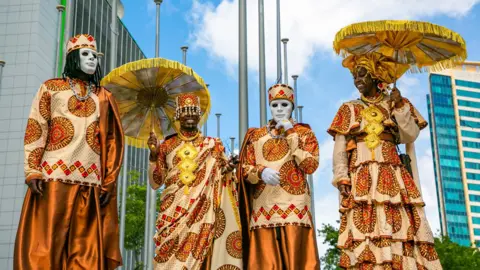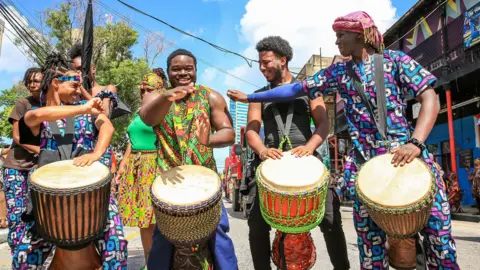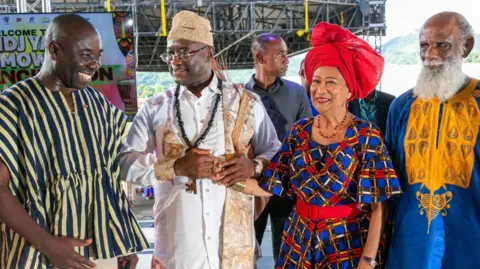BBC News
BBC News in St. Jones
 EPA
EPAAugustine Ogbu works as a doctor, treating patients in clinics across the amazing ST Lucia Island.
When he returns to his home in the coastal town of Rodney Bay, he records his second job – as the owner and the unilateral chef for his Nigerian meals.
“Egusi and Fuffu soup, this is more popular … they love Jollof Rice as well,” says Dr. Ogbo.
The 29 -year -old from Nigeria – 230 million people – is descended from the Atlantic Ocean of Sant Lucia – with a population of 180,000 – for training as a doctor in 2016.
He created fast food at home, named Africa Chops, in 2022, after he was constantly asked his friends to ST Lucian for the Nigerian fare.
Dr. Ogbo BBC tells, not only that ready -made meals are prosperous, and not only because his clients on the island believe that food is delicious.
“They know that we all have the same origin of grandparents. So most of the time, they want to communicate with that,” Dr. Ogbo explains, adding that interest in African culture has grown “greatly” since it reached a decade ago.
Saint Lucia is not alone in this phenomenon.
Through the Caribbean Sea region, the desire to re -contact the population It seems that African heritage has strengthened over the past few years.
People across the Caribbean region express African pride through cultural means, such as food, clothes and travel, while governments and institutions from both sides of the Atlantic Ocean have gathered to depict economic relations.
Africa had a long presence in the Caribbean.
An important part of the inhabitants of the islands from West and Central Africa, who were forcefully transferred to the Caribbean Sea by European merchants in the seventeenth and eighteenth centuries.
Slavery was canceled in a large part of the Caribbean Sea region during the nineteenth century, while independence came from European powers in the following century.
The grandchildren of slave people retained some African customs, but they have largely developed their independent cultures, which differ from the island to the island.
In the past, there were major campaigns to encourage African pride, as it runs Durbren Umardi, who runs the Antigua and Barboda Support Committee.
“It was particularly strong in the 1930s or so, then again in the 1960s – we saw a large flow synchronization with [American] “The Black Power movement during that period,” he says, speaks to the BBC on the island of Antigua.
Mr. O’Marde believes that the Caribbean Sea region is witnessing a promising renewed version more than the “general African” (a term used to describe the idea that people of African origin should be united).
He says: “It has expanded beyond psychological and cultural topics and we are now talking about broader economic phrases, such as the strongest transport links between the Caribbean and Africa region,” he says.
“We are in a different stage now of Africa-one will not fade before.”
 EPA/Shutterstock
EPA/ShutterstockThe only thing that separates this wave of African pride from those that came before is social media.
Dennis Howard, a lecturer for entertainment institutions and cultural institutions at the University of the West Indies, says that a “important” quantity of Jamaicans is connected to Africa through platforms such as Tijook.
“People are learning more about black history behind slavery,” he told BBC from his home in the Jamaican capital, Kingston.
Mr. Howard also refers to the global rise of Afrobeats, a musician of Nigeria and Ghana.
He feels that in Jamaica specifically, the popularity of Afrobeats is partially due to the desire to reconnect with the continent.
“Through music videos, [Jamaicans] You see certain parts of Africa -like Jamaica and are developed. We had a concept of Africa as this place that is left behind and is a pure earthy path … music changed that. “
When asked about the point of view of some Jamaican commentators via the Internet – that the inhabitants of the islands do not need to restore their African heritage because they have a good Jamaican heritage, they are hard -starred – Mr. Howard emphasizes that the two are unique.
“Our entire culture is African, with a little Indian, European and Chinese spraying. But mostly, it is derived from the African. It is the most dominant part of our culture.”
Those who tend to their African heritage not only consume culture, but in reality they consume flights and explore the continent directly.
The Ghana Tourism Authority – once a major starting point for the worshipers who are shipped to the Caribbean – NBC was a “noticeable increase” in vacationers from the islands in recent years.
Likewise, Werner Groner, the South African Consul in the Bahamas, says that over the past two years or thirty, his office has witnessed a rise in the local population traveling to South Africa, Ghana and Kenya.
“I see a lot of attention on safari trips and I think people also start to realize that South Africa and other African countries are very well developed,” says Gronler.
 EPA
EPAEven Burkina Faso, an economically struggling country under military rule that is not known for tourism, apparently on the lists of some people. Mr. Umari says that some of his countryman wants to visit the country Because of the tendencies of the whole of Africa to its leader, Ibrahim Traore.
However, access to the mother continent from the Caribbean region can be complicated, as travelers often force to fly across Europe.
Earlier this year, in a speech in which he referred to herself in the name of “the daughter of Africa”, she called on the Prime Minister of Barbados Mi Motley to build “air and sea bridges” between Africa and the Caribbean.
“Let’s make these changes, not only for the heads of state, but for ordinary people who want to trade, travel and photograph a common future,” she said.
The main institutions such as the African Union, the African Development Bank (AFDB) and the African Export Bank (AFREXIMBANK) operate on the angle of “trade”, hosting conferences and creating memoranda of understanding with their counterparts in the Caribbean.
Afreximbank says that trade between the two regions can jump from about 730 million dollars (540 million pounds) to $ 1.8 billion (1.33 billion pounds) by 2028, provided that the correct conditions are achieved.
But at the present time, Africa and the Caribbean region have some of the world’s lowest indicators for transportation infrastructure, quality of logistical services and customs efficiency, according to the World Bank.
In an attempt to reduce commercial barriers, the heads of Minsters in Grenada and Bahamas called this year to Africa and the Caribbean Sea region to launch a common currency.
Prime Minister Philip Davis told the delegates at a meeting of Afraf Bank in Nigeria, he should “seriously” consider one digital currency, while Descik Mitchell from Greenada said: “such a move will confirm in terms of symbolic and practically our common identity not only as commercial partners, but as members of Africa is real global.”
Get more than 60 countries to coordinate a standard system and launch it is easy, but Mitchell said that this should be done if the areas “control [their] Private future.
Returning to Saint Lucia, Dr. Ogbo says that his attempts to bring Igusi, Fofu and Golov to the local population are a small contribution but deserve to strengthen relations between Africa and the Caribbean.
In June, Nigerian President Paula Tenobo signed various cooperation agreements with Saint Lucia during a government visit and Dr. Ogbo believes that African pieces are an extension of this.
“I can say that I am working alongside the Nigerian government and even the government of Saint Lucian to promote African culture,” he says.
The doctor and businessman are now trying to upgrade his dietary work to a full restaurant – and he hopes that “cultural exchange” between Africa and the Caribbean region also moves from strength to strength.
“It’s great!” He says. “I really, very excited about it.”
You may also be interested in:
 Getty Images/BBC
Getty Images/BBC
https://ichef.bbci.co.uk/news/1024/branded_news/1287/live/31ddc0f0-7b72-11f0-ab3e-bd52082cd0ae.jpg
2025-08-18 00:43:00














